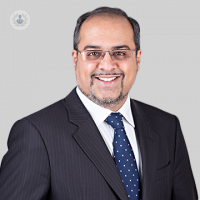What you can do after your hip surgery
Escrito por:Although the experience and expertise of a surgeon can be the driving force behind the success of any hip surgery, there are many important steps you as a patient can make too to ensure your hip surgery goes as well as you’d hoped. Mr Rishi Chana, a trauma and orthopaedic surgeon based in London explains more:

What are the most important questions a patient should ask a prospective surgeon before undergoing hip surgery?
An important part of the hip surgery process is to ask your surgeon a few questions prior to help you prepare for your operation. This way you will know in advance what is expected of you before the operation and during the recovery phase to reach a realistic goal. Some of these questions might be:
- Have we tried everything short of surgery to improve my hip? What other treatments can we consider?
- What do you think a realistic goal for recovery looks like?
- Are there any complications I should be aware of?
- What activities can I do and which should I avoid?
- What can I do to ensure we achieve our agreed plan?
When picking a physical therapist for post-op rehab, what sort of questions should a patient ask?
Experience, confidence and expertise are essential here. You should ideally find someone who knows and understands your surgeon’s philosophy and exactly what they’ve done. This will greatly improve the effectiveness of physical therapy in your recovery.
Likewise, you, the surgeon and physical therapist should all be on the same page about understanding what has happened and how your body is going to respond to physical therapy. You should have a mindful approach in listening to your body, meaning you shouldn’t push too far and know when to step it up or take a step back. If you stick to these guidelines, you will be pleased with the outcome.
What type of surgeon should a patient look for?
If you are more familiar with the medical terms than your surgeon, walk away!
Expertise and knowledge in knowing when the joint can or cannot be saved are key here. You should find an experienced surgeon you feel comfortable with and take your time in doing research and asking questions.
For example, you should ask your surgeon what they can do for labral defects and know how many labral repairs, cartilage defect and pincer takedown procedures they have performed in their lifetime. An experienced surgeon in this field typically needs to have performed over 150 procedures to get to an expert level.
Your surgeon should also know their own outcomes and show you this data. Performing a high volume of this type of surgery keeps the surgeon’s skills at a high level, so they should be performing at least 70 procedures per year. They should also be fellowship qualified and an upstanding member of the International Society of Hip Preservation (ISHA).
How can a patient contribute to the success or failure of their results?
The hardest part for the patient comes into play immediately after surgery. They often ask, how do I get back to normal function and make a great recovery? What does this look like? Of course, this can be quite different depending on your circumstances but the most important advice I give is to be in good health and shape before undergoing surgery, especially by improving your core strength. If there is no strength there to begin with then the recovery road is much longer and harder, as we have to build your muscle, strength, stamina and endurance from scratch. As a rule, having a strong core pre-op will allow a faster recovery!
What’s equally important is to always listen to your physical therapist, surgeon and your body and be patient: your body heals at a natural speed that cannot be rushed. Pushing yourself too much may cause an injury - which will only slow down your recovery speed.
There are also some drugs available that may help for pain relief, reduce inflammation and promote cartilage growth to enhance success. Your surgeon will talk you through these options.
Mr. Rishi Chana is an expert hip surgeon based in London and the surrounding area. If you would like to book a consultation with him, visit his Top Doctors profile and check his availability.


